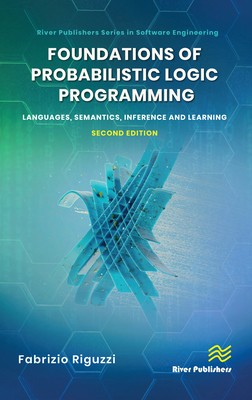
- We will send in 10–14 business days.
- Author: Fabrizio Riguzzi
- Publisher: River Publishers
- ISBN-10: 8770227195
- ISBN-13: 9788770227193
- Format: 15.6 x 23.4 x 3 cm, kieti viršeliai
- Language: English
- SAVE -10% with code: EXTRA
Reviews
Description
Probabilistic logic programming extends logic programming by enabling the representation of uncertain information by means of probability theory. Probabilistic logic programming is at the intersection of two wider research fields: the integration of logic and probability and probabilistic programming. Logic enables the representation of complex relations among entities while probability theory is useful for modeling uncertainty over attributes and relations. Combining the two is a very active field of study. Probabilistic programming extends programming languages with probabilistic primitives that can be used to write complex probabilistic models. Algorithms for inference and learning tasks are then provided automatically by the system. Probabilistic logic programming is at the same time a logic language, with its knowledge representation capabilities, and a Turing complete language, with its computation capabilities, thus providing the best of both worlds.
Since its birth, the field of probabilistic logic programming has seen a steady increase of activity, with many proposals for languages and algorithms for inference and learning.
This book aims at providing an overview of the field with a special emphasis on languages under the distribution semantics, one of the most influential approaches. The book presents the main ideas for semantics, inference, and learning and highlights connections between the methods. Many examples of the book include a link to a page of the web application http: //cplint.eu where the code can be run online.
This 2nd edition aims at reporting the most exciting novelties in the field since the publication of the 1st edition. The semantics for hybrid programs with function symbols is placed on a sound footing.
EXTRA 10 % discount with code: EXTRA
The promotion ends in 22d.20:42:17
The discount code is valid when purchasing from 10 €. Discounts do not stack.
- Author: Fabrizio Riguzzi
- Publisher: River Publishers
- ISBN-10: 8770227195
- ISBN-13: 9788770227193
- Format: 15.6 x 23.4 x 3 cm, kieti viršeliai
- Language: English English
Probabilistic logic programming extends logic programming by enabling the representation of uncertain information by means of probability theory. Probabilistic logic programming is at the intersection of two wider research fields: the integration of logic and probability and probabilistic programming. Logic enables the representation of complex relations among entities while probability theory is useful for modeling uncertainty over attributes and relations. Combining the two is a very active field of study. Probabilistic programming extends programming languages with probabilistic primitives that can be used to write complex probabilistic models. Algorithms for inference and learning tasks are then provided automatically by the system. Probabilistic logic programming is at the same time a logic language, with its knowledge representation capabilities, and a Turing complete language, with its computation capabilities, thus providing the best of both worlds.
Since its birth, the field of probabilistic logic programming has seen a steady increase of activity, with many proposals for languages and algorithms for inference and learning.
This book aims at providing an overview of the field with a special emphasis on languages under the distribution semantics, one of the most influential approaches. The book presents the main ideas for semantics, inference, and learning and highlights connections between the methods. Many examples of the book include a link to a page of the web application http: //cplint.eu where the code can be run online.
This 2nd edition aims at reporting the most exciting novelties in the field since the publication of the 1st edition. The semantics for hybrid programs with function symbols is placed on a sound footing.


Reviews